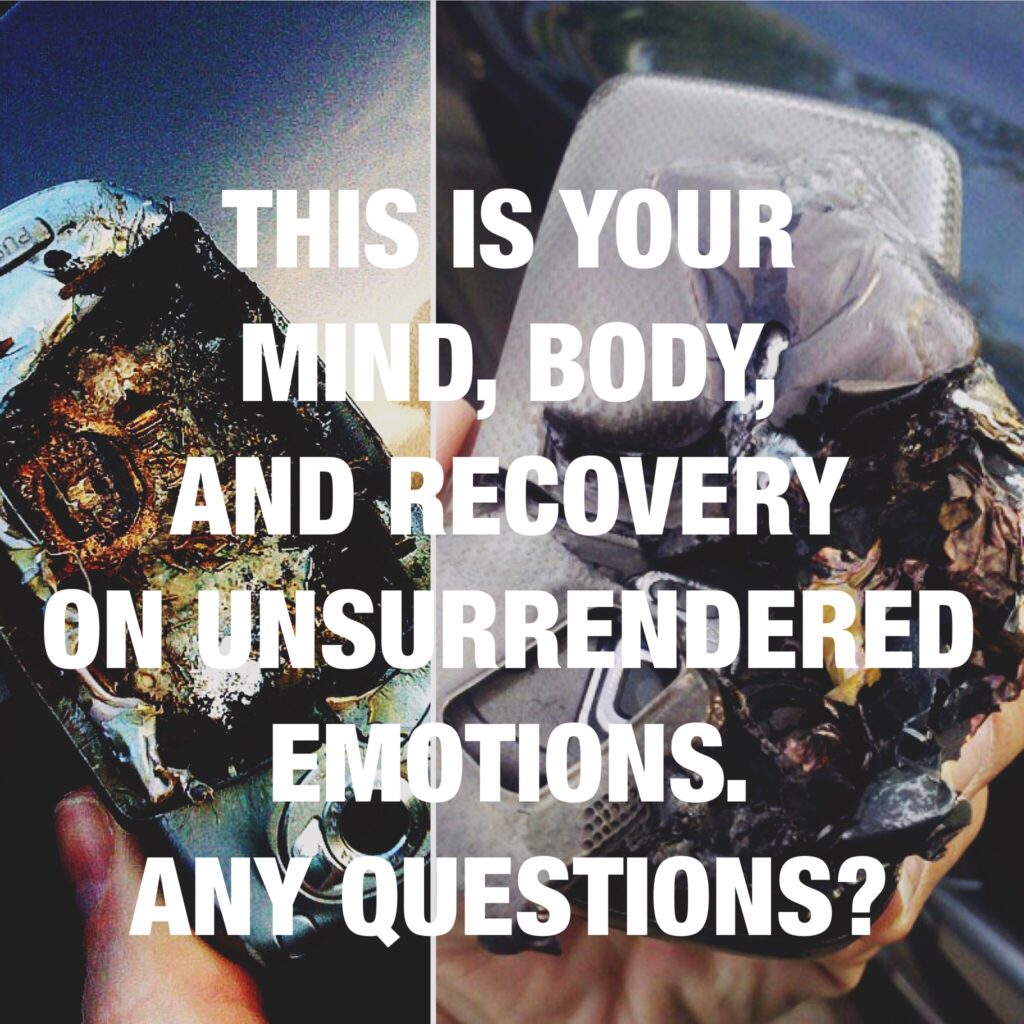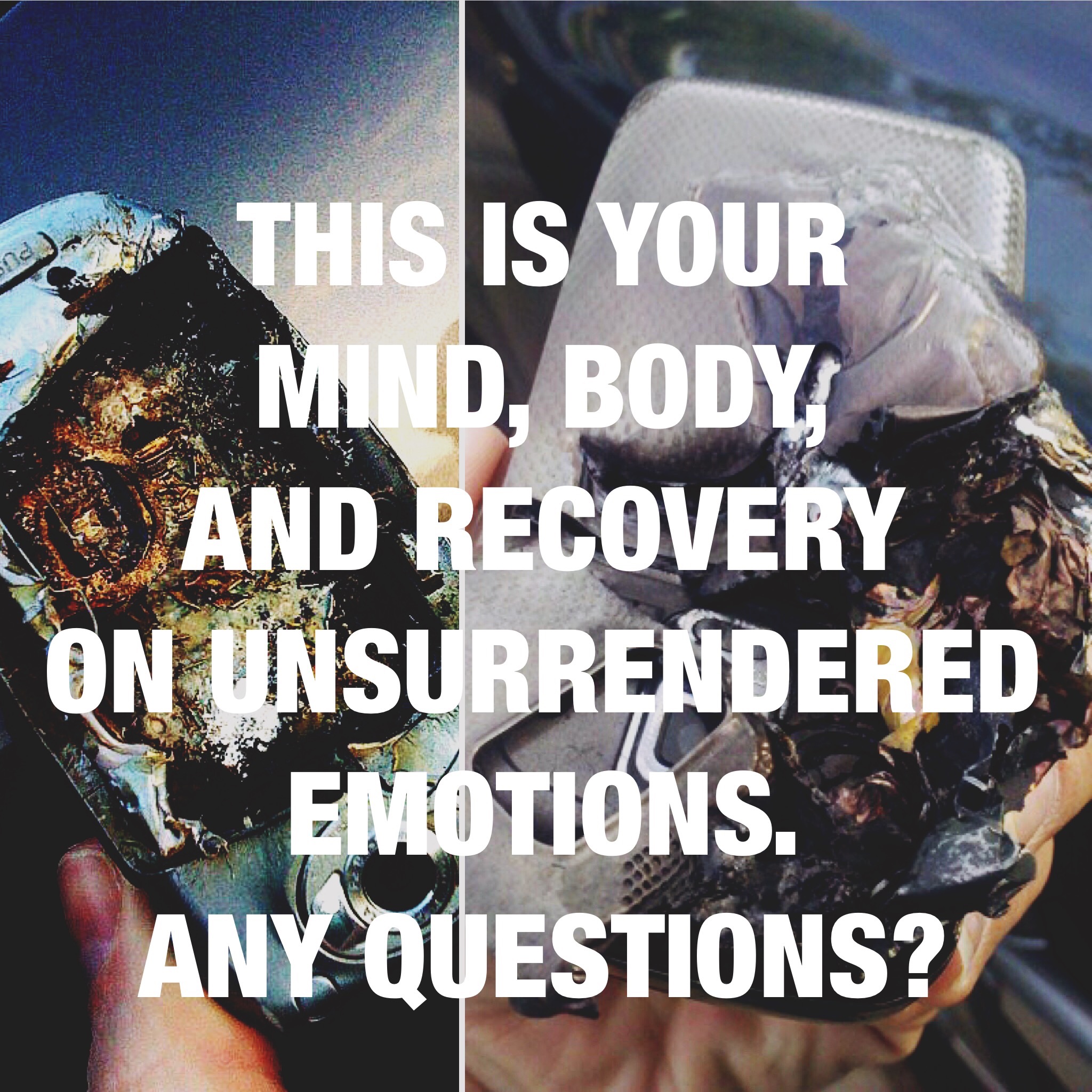This post about un-surrendered emotions was submitted by one of our fellows in recovery. If you would like to submit your thoughts on recovery from addiction or questions you might have, submit them here.

I can’t remember if this is something I made up or if I heard it elsewhere, but in the spirit of recovery I’ll give someone else the credit for the following analogy. 🙂
It seems pretty straight forward – use a mobile device and it drains the battery; plug it into a power source and it charges the battery.
But here’s the thing about charging the battery … if there isn’t a power regulator of some kind then the battery will overcharge and explode (like in the two pics above). Also, if that regulator is damaged in any way then you’ve got the same problem.
Human beings are like batteries—or more like superconductors—and our emotions are the power.
Here’s the tricky part: the power supplies are EVERYWHERE, and they don’t care what kind of charge they transfer, positive or negative. A joyful reunion with friends can be a wonderfully and positively charging experience, but it can also be sandwiched between triggers, sadness, and frustrations of all kinds.
The key is that all of it—the positive, negative, beautiful, and ugly—has a charging effect on the body, and without healthy regulation and release its emotional energy builds up in our being.
Just like those phone batteries, if we become overcharged we too will explode. It doesn’t have to be a fiery eruption that torches relationships, it can be a slow and ever-encroaching lava flow that pushes people away into safer realms.
I’ve thought a lot about this recently, including what methods I employ (as a superconductor of emotion) to try and regulate the in-and-out flow of energy.
I used sex and porn as emotional dampeners, but those were only a toxic façade used to numb myself from the continued effects my increasingly pent up emotions were having on me and others.
I’ve used food, music, video games, and other numbing agents to distract me from my feelings, all to varying degrees of harmfulness.
So, if we are indeed emotional superchargers, how are we supposed to regulate the awesome and often overwhelming power of our emotions?
What, if not the numbing agents, is there for us to use to not freak out on everything and everyone we encounter?
It’s surrender.
It’s sitting with the emotions as they surface, holding space for them without judgment, and then sharing them with those trusted and safe people in our lives that have earned the right to hear our stories.
Emotions and our existence as emotional batteries have taught me that it’s all about forging connections.
When we allow emotion to flow through us to others in healthy ways, we invite connection.
When we hold onto it, stuff it, or otherwise attempt to diffuse it with any number of numbing agents, we simply become overcharged and prone to dangerous explosions.
I choose surrender.
I choose connection.








Apologies to those who can’t quite tell what the image is behind the meme. I probably should have just picked one of those pics instead of combining the two. 🙂 I look forward to your comments!
This is an awesome analogy! Thanks.
I’ve been reading about Step 6 and trying to work on it, and your words remind me of this in the “Twelve and Twelve,”
Since most of us are born with an abundance of natural desires, it isn’t strange that we often let these far exceed their intended purpose. When they drive us blindly, or we willfully demand that they supply us with more satisfactions or pleasures than are possible or due us, that is the point at which we depart from the degree of perfection that God wishes for us her on earth. That is the measure of our character defects, or, if you wish, of our sins. (p. 65)
The natural desires aren’t bad things necessarily, but when I let them get out of control, they become defects – they become “my will vs. God’s will.”
Then, those same desires that are there to help me survive and enjoy life because tools I use to numb out and cope with life’s challenges. My regulators become broken and I can’t tell the difference between safety and hell.
Thanks for the time you put into this. I look forward to good conversation!
You’re most welcome! Like I said in the first sentence, I give credit to someone else (whomever that might be) for the analogy. It’s really helped me remember the need for surrender and one of the main purposes for emotions. We make so many decisions, conscious and subconscious, based on not only our emotions but how we perceive the emotions of others, aka body language. Making sure that our own emotions are understood and managed healthfully through positive connection is so important, and that much more important for addicts.
What a great analogy. I think of my own life and how I’ve simply grown up only coping with stress and the challenges of life with nothing but those numbing agents and mechanisms. As I’ve started working on sobriety and recovery, I’ve noticed that my mind and body can’t cope as easily with regular everyday stress and anxiety. It’s been so used to escaping it by relying 100% on my drug of choice. Working my recovery has now been a learning experience of how to rely on God, others, and healthy coping mechanisms that allow me to not just run 100% away from challenges and conflict, but how to surrender my will, walk into them with clarity, and live a life of recovery. So to relate to this analogy, I had to change my batteries AND my charger. ?
So true, Jon! I think many of us have to replace our emotional battery, regulator, and charger because of addiction and how out of control we have become.
I love the words of Brene Brown when she talks about leaning into the discomfort of our emotions, not running from it. It’s running from our emotions that gets us in trouble in the first place, so replacing one bad coping mechanism with another somewhat less-bad coping mechanism just kicks the can down the road a little ways. While in the early stages of recovery, many of us are required to draw really drastic boundaries and bottom lines around even the possibility of being exposed to triggers. That’s a good thing, but it cannot be sustained for too long. Life is full of triggers, and being able to see a trigger for what it is and surrender it in the moment is the real work of recovery. Otherwise we would have to eventually result to being hermits, totally the opposite of what it means to be human, because we are hard-wired to be social creatures.
I remember you (JR) sharing this in group. Good stuff. This is how things used to play out. I would get frustrated, discouraged, stressed, rejected, resentful, etc. Then, I would start to toe the line looking at “gray material” online, just to “take the edge off,” but still be able to say I hadn’t acted out. But, that would just stoke the fire, and sooner or later (usually sooner) I would look at pornography. I was unaware of all of this process, and would act surprised and discouraged about why I had acted out again. Now it goes this way. I get frustrated, discouraged, stressed, rejected, resentful, etc., and my wife tells me something seems up (i.e., I’m being a jerk to the family, or seem really distant). At first I get defensive, or minimize it. But, when she keeps bringing it up I try to dig deep. This usually involves journaling and calls. I then share with her, and I seem to get back on track within a few days (without any toeing the line or relapsing). I hope in the future I can be more mindful on a daily basis, and then promptly notice, on my own, when I feel off. I can then take action before it starts to negatively affect my family.
Thanks Sam. This analogy has reminded me of how my emotional regulators have been compromised by past events or choices. A damaged emotional regulator is part of what working recovery begins to fix, and also why working recovery is not a finite event with an obvious end state, but rather a lifelong process. Fixing a broken regulator is really more of a retraining activity. We’ve spent many years telling our emotions that they’re too painful, dangerous, and undesirable for us, so we attempted to hijack them through numbing activities. The catch is that the emotions never went away, but we just learned to ignore them and cover them with sex until they became too painful, toxic, or explosive to ignore – and that’s when it was too late for them to have healthy expression and the power to connect us to others. I’ve really appreciated the words of Brené Brown about connection and vulnerability as I’ve tried to practice recovery, because her words remind me that the bravest thing I can do with my emotions is approach them with curiosity and vulnerability, and then share them with others from that same place of vulnerability and curiosity.